Modal verbs are so common that most English speakers don't even know what the grammatical name for them is. Note that modal auxiliary verbs are a type of auxiliary verb. Auxiliary verbs encompass tenses, aspects, modality , voice, emphasis and so on. There are many other category of verbs in English like phrasal verbs.
In this ESL skills course you can learn natural English phrases. Learn even more about English grammar in this introduction to grammar course. Modal auxiliary verbs are used to show a necessity, capability, willingness, or possibility. Unlike most verbs, there is only one form of these verbs. Typically, verb forms change to indicate whether the sentence's structure is singular or plural.
Most verbs also indicate whether something happened in the past, present, or future. This is not the case with most modal auxiliary verbs, which makes them simpler to understand and use correctly. Like other auxiliary verbs, modal verbs work together with a main verb to give a different meaning to a sentence/clause than if the main verb was used by itself. Modals/ modal verbs/ modal auxiliary verbs are a special type of verbs present in English grammar. These verbs are used irregularly in English grammar.
Uses of modal verbs in English grammar includes providing extra information about the action of the main verb. These auxiliaries express obligation, possibilities, permission or ability in a sentence by adding meaning to the main verb. As per modal verbs rules, the spelling or form do not change, unlike other verbs.
In the strict sense, though, these other verbs do not qualify as modal verbs in English because they do not allow subject-auxiliary inversion, nor do they allow negation with not. If, however, one defines modal verb entirely in terms of meaning contribution, then these other verbs would also be modals and so the list here would have to be greatly expanded. In English, modal verbsare a small class of auxiliary verbs used to express ability, permission, obligation, prohibition, probability, possibility, advice. The nine modal verbs outlined above are different from other verbs in that they never change forms. Even when obeying subject-verb-agreement, these verbs will be identical when used with singular or plural subjects as in Cheetahs can run fast and a cheetah can run fast.
What Is Modal Verb In English Grammar In addition to this, these verbs typically are used only with certain verb tenses. For example, you are likely to hear the sentence It might be cloudy tomorrow but are unlikely to hear the sentence It might will be cloudy tomorrow. Generally speaking, these modal verbs are most often used with verbs in the present tenses .
There are a wide variety of modal auxiliary and their function. So, let's waste no more time and begin the learning journey. The modal verbs in English grammar are can, could, may, might, must, need not, shall/will, should/ought to. They express things like ability, permission, possibility, obligation etc. They do not take -s in the simple present and they do not have a past simple or past participle form. However, some modal verbs have alternative forms that allow us to express the same ideas in different tenses.
Modal auxiliary verbs like can, may, ought, shall, and wood are used to suggest an impending or possible upcoming action. Learn to identify modal auxiliary verbs, understand their purpose, and indicate past tense with the provided examples. The main use of the modal verb "will" is to form the future form of the verbs in English. When talking about demands and requests, the use of will sometimes is not as polite as other modal verbs.
This verb has many different possible uses. It can be used to talk about ability and permission in the past. Also, just like the modal verb "can", the modal verb "could" can be used to make questions, requests, suggestions or offers, but in a more polite way. It can also be used to talk about possibilities, but not as strong possibility that the one expressed with "can". In English, the modal verbs are used to express ability, possibility, permission or obligation. Each one of the modal verbs can be used to express one or more of these modalities.
They can also be used to form the future tense in English and to make conditional sentences. Have to is often grouped with modal auxiliary verbs for convenience, but in fact it is not a modal verb. In the have to structure, "have" is a main verb. Before we get started learning how to use modal verbs, let's take a look at what modal verbs are. According tothis article from Grammarly, modal verbs are classified as auxiliary verbs.
"Auxiliary verbs" are helping verbs, which means you use them with other verbs in your sentences. In many Germanic languages, the modal verbs may be used in more functions than in English. In German, for instance, modals can occur as non-finite verbs, which means they can be subordinate to other verbs in verb catenae; they need not appear as the clause root. In Swedish, some modal verbs have infinitive forms. This for instance enables catenae containing several modal auxiliaries. The modal verbs are underlined in the following table.
As if English wasn't hard enough to learn, modal verbs complicate things even further. There are a lot of irregularities in the English language that can be confusing to students learning it as a second to their native tongue. English and other Germanic languages, however, utilize modal verbs to help express a function and are vital to gaining command of the English language. The grammatical form that can function as the modal in English grammar is the verb phrase.
The nine auxiliary verbs, or modal verbs, that can function as the modal are the verbs can, could, may, might, must, shall, should, will, and would. The five quasi-modal verbs that function as modals are ought , had better , used to, dare, and need. Since modal auxiliary verbs do not have a past tense form, we can use the modal auxiliary along with the word 'have' and a past participle. Past participles typically end in -d, -ed, -n, or -en, creating the past tense 'wished, looked, taken,' and so forth. Let's take a look at an example in the present tense. All of these modal verbs must come before a verb to help express at least one of the modality examples listed above.
In some cases, though they can be used to express more than one modality, but you'll see more on that in the following section. So, let's take a look at some example sentences and highlight how the modal verb is expressing modality and adding more information to the verbs that follow them. Modal verbs are used to express ability, obligation, permission, assumptions, probability and possibility, requests and offers, and advice. Each modal verb can have more than one meaning which depends on the context of that sentence .
Modal verbs show intention, rather than action. When used with other verbs in the sentence, they can make your meaning as clear as you want it to be. Test your knowledge of modal verbs with an examination of may vs. might. You can also make sure you're using can vs. could correctly in your writing and everyday speech. VerbTom and Suemightarrivelater.Everyonecanswim.In questions, the word order changes to modal + subject + main verb. Here are some examples with Yes / No questions.
In addition, the same modal verb can be used to express different things. For example, the modal verbcanmay be used to talk about ability (e.g.He can speak several languages.)or to indicate how probable something is (e.g.The procedure can be painful.). In our Grammar for IELTS series, we're looking at a variety of complex grammatical structures that you can use on the Speaking and Writing modules of your IELTS test. Today we'll be talking about modals, also known as modal verbs or modal auxiliaries, and will look at examples to help you better understand their many uses in English.
Prepared list of sentences using a wide range of modal auxiliary verbs . The modal verb "might" is used to express possibility in the present or in the future. It can be used as the verb "may" most times, however, it often means that the event has less possibility of happening than when it's said using may.
Its negative form, "might not " is used to talk about possibilities but in a negative way. Hawaiian Pidgin is a creole language most of whose vocabulary, but not grammar, is drawn from English. As is generally the case with creole languages, it is an isolating language and modality is typically indicated by the use of invariant pre-verbal auxiliaries. The invariance of the modal auxiliaries to person, number, and tense makes them analogous to modal auxiliaries in English. However, as in most creoles the main verbs are also invariant; the auxiliaries are distinguished by their use in combination with a main verb. Read the following examples and explanations carefully.
Modal verbs are a part of the larger category called auxiliary verbs which are verbs that cannot be used on their own. They need to be accompanied by another verb. Sometimes modal verbs are called modal auxiliaries. We use modal verbs to express ability, to give advice, to ask for and give permission, to express obligation, to express possibility, to deduce and to make predicitions.
Modal verbs are auxiliary verbs, also known as helping verbs. They work with other verbs to show various conditions, such as possibility or necessity. Modal verbs do not change form based on the verb tense of the sentence; they do not have conjugated forms. Modals function within verb phrases functioning as predicates.
Only one grammatical form can perform the function of modal in English. The one grammatical form that can function as the modal is the verb. Only the modal verbs can, could, may, might, must, shall, should, will, and would and the quasi-modal verbs ought , had better , used to, dare, and need can function as a modal.
Write down all the sentences with modal auxiliary verbs. Indicate what type of modal auxiliary verb is used in each sentence. This activity will get students up and moving while they practice what they have learned about modal auxiliary verbs. As a modal verb, "should" has many important uses in the English language.
It's used to give advice, to express what's right, and to recommend an action. Also, it's used to make predictions, but ones that are more uncertain than those with the other modal verbs. In order to read or download modal verbs of ability and permission exercise at auto english pdf ebook, you need to create a FREE account. Modals can be defined as a subset of the English auxiliary verbs and are used to show modality like obligation, and possibility, etc. They don't have an infinitive form or participle which can be used to differentiate them from other verbs along with their neutralization.
Normally modal verbs cannot work alone and must work with the main verb. There are certain rules which surround the use of modal verbs, for example the word 'to' must never be used after a modal verb. Learning these rules and how a modal verb can function within a sentence can greatly help you in forming grammatically correct sentences. Modal verbs are for example may, can, must, should, need. They express an ability, permission, wish etc. to do something. (I may, can, must swim.) Many modal verbs cannot be used in all of the English tenses.
That's why we need to know the substitutes to these modal verbs. As you've seen in this article, modal verbs are useful when it comes to expressing ideas and making polite requests. They're super versatile, and you can use them in all kinds of situations.However, make sure that you don't use too many modal verbs in your conversations. Similar to when you're making a request, modal verbs can change your sentence from a statement to a question. That automatically makes your sentence sound more polite because it's not being presented as a demand. -,gamōtmaymögen, magmogen, magmögen, magmeie, meimagmå(må)mega, mámagum, magwissen, weißweten, weet?
Witte, witweetvedvetvita, veitwitum, wait(tharf)dürfen, darfdurven, durfdörven, dörvdoarre, doardurf? Þaúrbum, þarfThe English could is the preterite form of can; should is the preterite of shall; might is the preterite of may; and must was originally the preterite form of mote. (This is ignoring the use of "may" as a vestige of the subjunctive mood in English.) These verbs have acquired an independent, present tense meaning. The German verb möchten is sometimes taught as a vocabulary word and included in the list of modal verbs, but it is actually the past subjunctive form of mögen. Often 'could' can be used to replace can to express modality in a slightly different way.
Look at the first example for can again – if you changed 'I can run' to 'I could run' you are still expressing ability, but you are now expressing past ability instead. Try replacing could in the other two sentences too. Auxiliary verbs add grammatical or functional meaning to the clauses in which they are used. They can be used to express aspect, voice, modality, tense, etc. For example, I have read this book so many times. "Have" is an auxiliary, which helps express the perfect aspect.
In English grammar, a modal is a verb that combines with another verb to indicate mood or tense. A modal, also known as a modal auxiliary or modal verb, expresses necessity, uncertainty, possibility, or permission. Past modal verbs such as may and might can also speculate about something that has happened. As in other modal examples, adding "not" makes the sentence negative. You can also use modal verbs of necessity in imperative sentences. Must and should are commonly found when a speaker gives advice or makes commands.
Some speakers add can to this list, as in "Can I spend the night at David's house? " Strict grammarians believe that may is the proper modal verb to use in these cases, as can is traditionally a modal of ability. However, the rules regarding can vs. may have loosened up to allow can as a modal of permission in informal cases. All of the following sentences use modal verbs.
Remember that modal verbs can also be used in the negative. "Can" is one of the most commonly used modal verbs in English. It can be used to express ability or opportunity, to request or offer permission, and to show possibility or impossibility. When the modal verbs 'should' or 'ought to' are used it indicates that there is a requirement to carry out an action, but it has yet been completed. There could be many reasons why that obligation has not been enacted. Usually, a phrase, clause or sentence will explain why the action has not yet been completed.




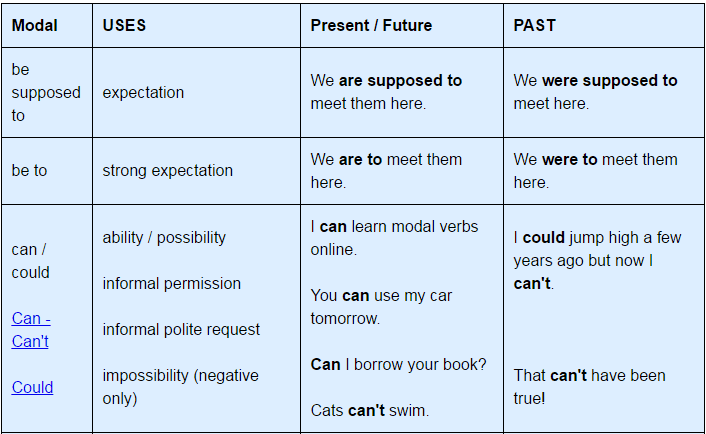

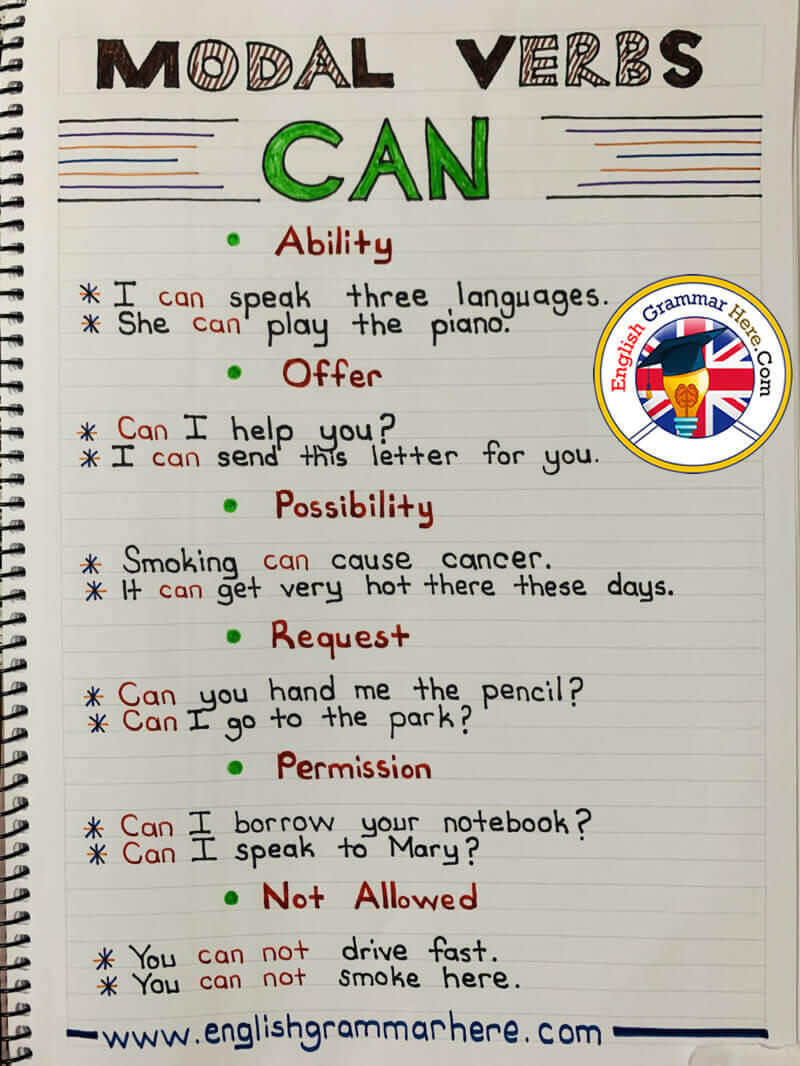







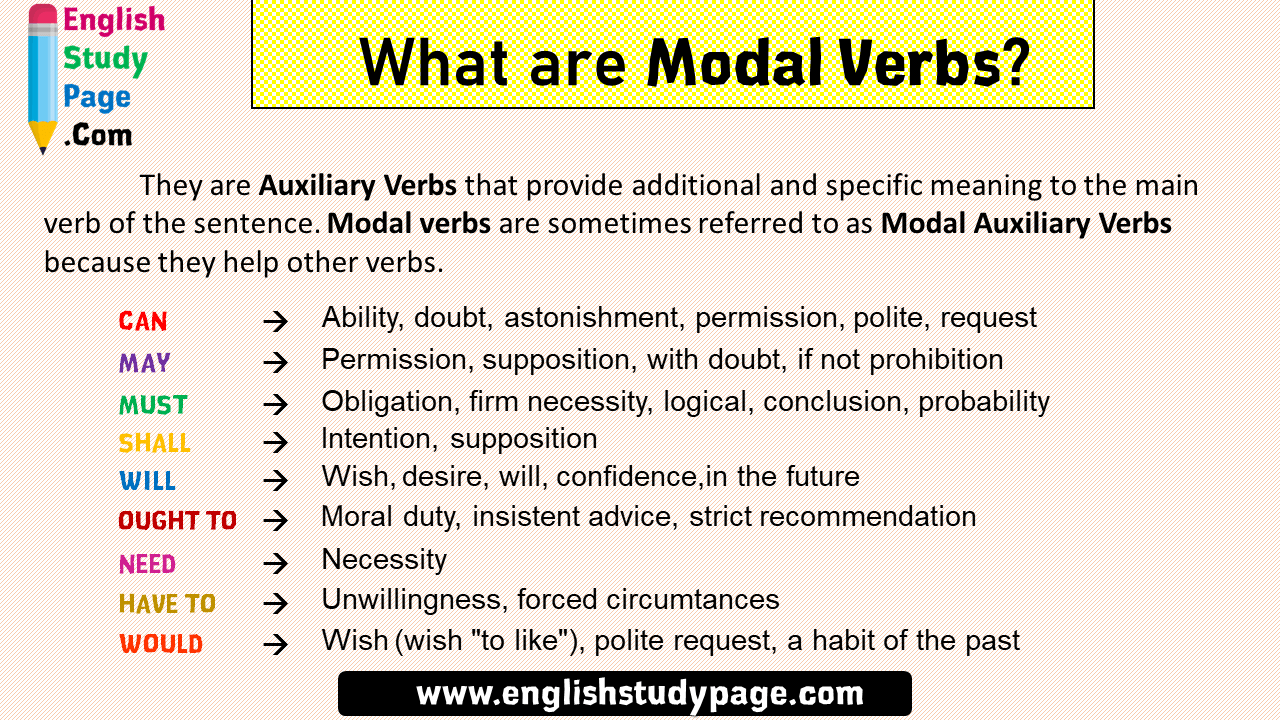
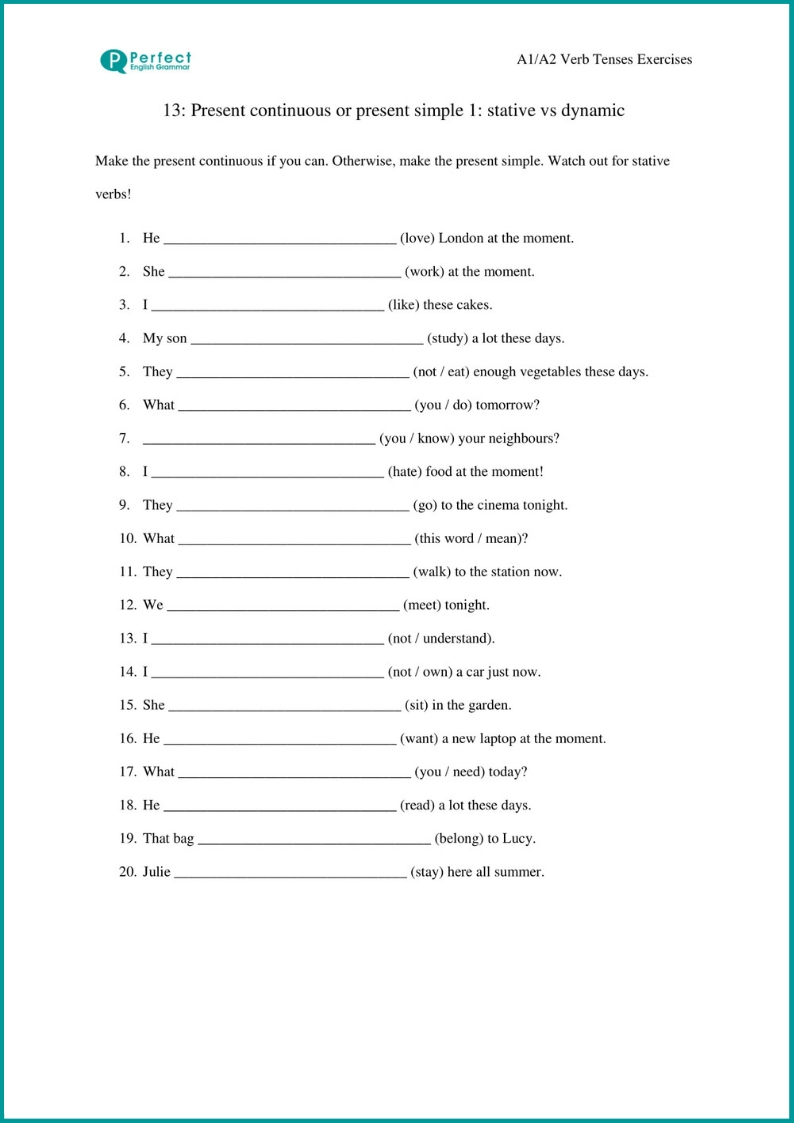
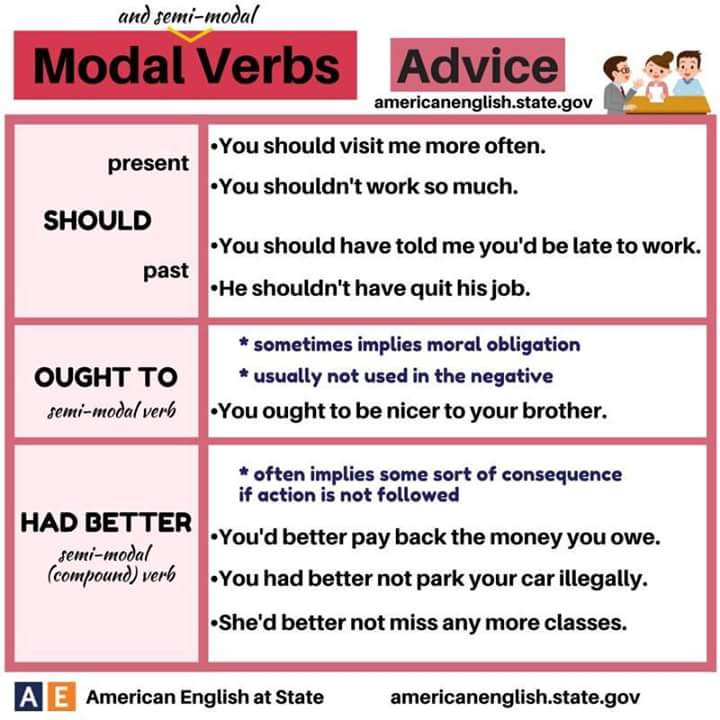












No comments:
Post a Comment
Note: Only a member of this blog may post a comment.